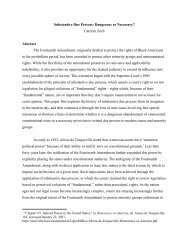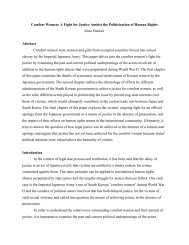Brown Undergraduate Law Review — Vol. 2 No. 2 (Spring 2021)
We are proud to present the Spring 2021 issue of the Brown Undergraduate Law Review. We hope that the works contained herein offer insight and inspiration to all who read them.
We are proud to present the Spring 2021 issue of the Brown Undergraduate Law Review. We hope that the works contained herein offer insight and inspiration to all who read them.
You also want an ePaper? Increase the reach of your titles
YUMPU automatically turns print PDFs into web optimized ePapers that Google loves.
The Failure of the Treatment of Low-Level Offenders in the Juvenile Justice System<br />
or diversion without understanding what is realistic for the<br />
situation. When unrealistic probation rules are put in place,<br />
and a child violates these rules, they can be forced into<br />
detention. An effective attorney advocate will understand<br />
these risks and navigate fair probationary and diversion<br />
programs.<br />
As established by In re Gault, the right to counsel is<br />
status, and other information to inform the judge. Without<br />
adequate time and investment in the child, incarceration<br />
may be used when a less restrictive and expensive option<br />
would be sufficient, like therapy or substance abuse<br />
treatment.<br />
A joint report from the Institute for Judicial Administration<br />
and American Bar Association advised counsel to be<br />
granted to juveniles when facing the possibility of present for juveniles from pretrial hearings to<br />
incarceration. 79 However, in many states, it is legal for<br />
children, or guardians, to waive the right to counsel for the<br />
child in juvenile hearings. In Ohio, a recent report by the<br />
National Juvenile Defender Center found that 80 percent of<br />
children accused of criminal wrongdoing were not<br />
represented by an attorney. 80 Many youth and their<br />
guardians may not understand the prospect of ?waiving?the<br />
right. In a study of competence to stand trial, youth were<br />
more likely to make choices deferring to authority, like<br />
accepting harsh probation standards or detention. 81<br />
post-disposition through the Juvenile Justice Standards<br />
(IJA-ABA, 1980). However, there are many barriers in<br />
accessing counsel in juvenile proceedings. Many states<br />
have no formal system to provide counsel, which gives<br />
discretion for judges to appoint counsel when available.<br />
Furthermore, since youth detention hearings occur only 24<br />
hours after an arrest, an attorney is often not appointed<br />
until the adjudication. This can result in children in<br />
pre-trial detention when they have never even met with an<br />
attorney.<br />
The waiver of attorneys is significant? as many as 90<br />
percent of adjudication hearings result in a plea bargain. 82<br />
Without adequate counsel, a child may not fully<br />
understand the plea bargain or the alternatives to accepting<br />
the bargain. By making uninformed decisions, and being<br />
influenced by a deference to authority, children are at risk<br />
for punishment and incarceration by a punitive system.<br />
Furthermore, In re Gault and subsequent cases only<br />
established a right to counsel at adjudication hearings, but<br />
disposition and post-disposition hearings are equally<br />
important for juveniles. Counsel at disposition hearings,<br />
where the court decides any placement or sanctions, can<br />
advocate for the child by presenting letters of support from<br />
the community, medical information, special education<br />
Due to these barriers, some youth may choose to waive<br />
their right to an attorney to be released from pre-trial<br />
detention. In Georgia, where bail can be set at $2,500 or<br />
more, many parents or children waive counsel to have an<br />
earlier hearing date. 83 In many states, youth can sign a<br />
waiver form without a guardian present and without first<br />
speaking to an attorney. 84 Further, even when public<br />
defenders are provided, they are often strapped with high<br />
caseloads and are therefore unable to use the total range of<br />
motions and investigations to defend their clients. 85<br />
Juvenile courts have a long way to go to ensure every child<br />
is given adequate counsel, as mandated by the<br />
Constitution.<br />
79. In re Gault, 387 US 1, 34.<br />
80. Judith B. Jones, ?Access to Counsel,? Juvenile Justice Bulletin: Office of Juvenile Justice and Delinquency Prevention, (2004), 8.<br />
81. Thomas Grisso et al., ?Juveniles?Competence to Stand Trial: A Comparison of Adolescents?and Adults?Capacities as Trial Defendants,? <strong>Law</strong><br />
and Human Behavior 27, no. 4, (Aug. 2003): 333-363.<br />
82. Jones, 2.<br />
83. Ibid., 8.<br />
84. Ibid.<br />
85. Ibid., 19.<br />
<strong>Brown</strong> <strong>Undergraduate</strong> <strong>Law</strong> <strong>Review</strong><br />
18










